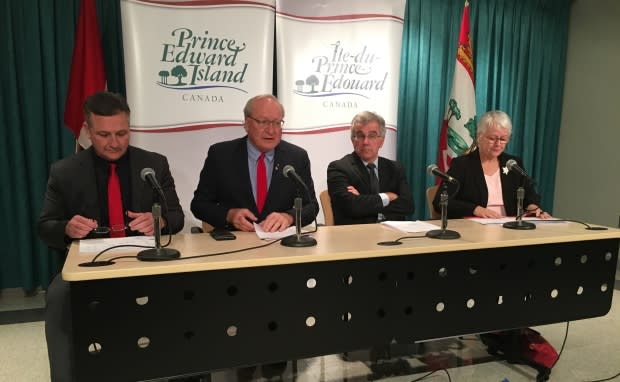P.E.I. 'disappointed' in new fuel charge, but pleased to escape federal carbon tax
Ottawa says it won't be implementing its federal carbon tax in Prince Edward Island — but the province says it is being required to implement a new fuel charge of four cents per litre.
The P.E.I. government says it is "disappointed" in the requirement and is already pledging to offset that charge by decreasing the provincial excise tax on gasoline by three cents per litre.
"We are disappointed, and I might say not happy that they are requiring a price ... on gas and diesel," Premier Wade MacLauchlan said at a media conference Tuesday afternoon. "We disagree with this response and our response will be to offset it so that our plan doesn't cost Islanders any additional dollars."

A provincial spokesperson said Ottawa wouldn't allow P.E.I. to fully offset the new charge by decreasing other taxes, but MacLauchlan said the province would find some way to return the extra one cent per litre to Islanders.
He said the province agreed to the change because Ottawa "made it clear to us in the past few days that Islanders would be subjected to the full federal backstop [carbon tax], including being forced to pay more to heat their homes."
No new tax on home-heating fuels
Under the new two-year deal between P.E.I. and Ottawa, the province said no new tax would be applied to home-heating fuels. Gas and diesel used in agriculture and fishing will also be exempt from the increase in taxes.
The increase and corresponding decrease in gasoline and diesel prices on P.E.I. will take effect April 1, 2019, when pump prices in the province will increase one cent.
On Tuesday the prime minister announced Ottawa would impose its federal carbon tax on four provinces — New Brunswick, Ontario, Manitoba and Saskatchewan.
The P.E.I. government said gas and diesel prices would increase by another cent overall in the second year of the deal.
MacLauchlan said the increased fuel taxes would generate $7.3 million in revenue over two years, compared with the $46 million he said the full federal carbon tax would have cost Islanders.
He said the auditor general would be enlisted to ensure all of the $7.3 million was returned directly to Islanders in a way that was revenue-neutral, but offered no specific details as to how that would happen.
More P.E.I. news

